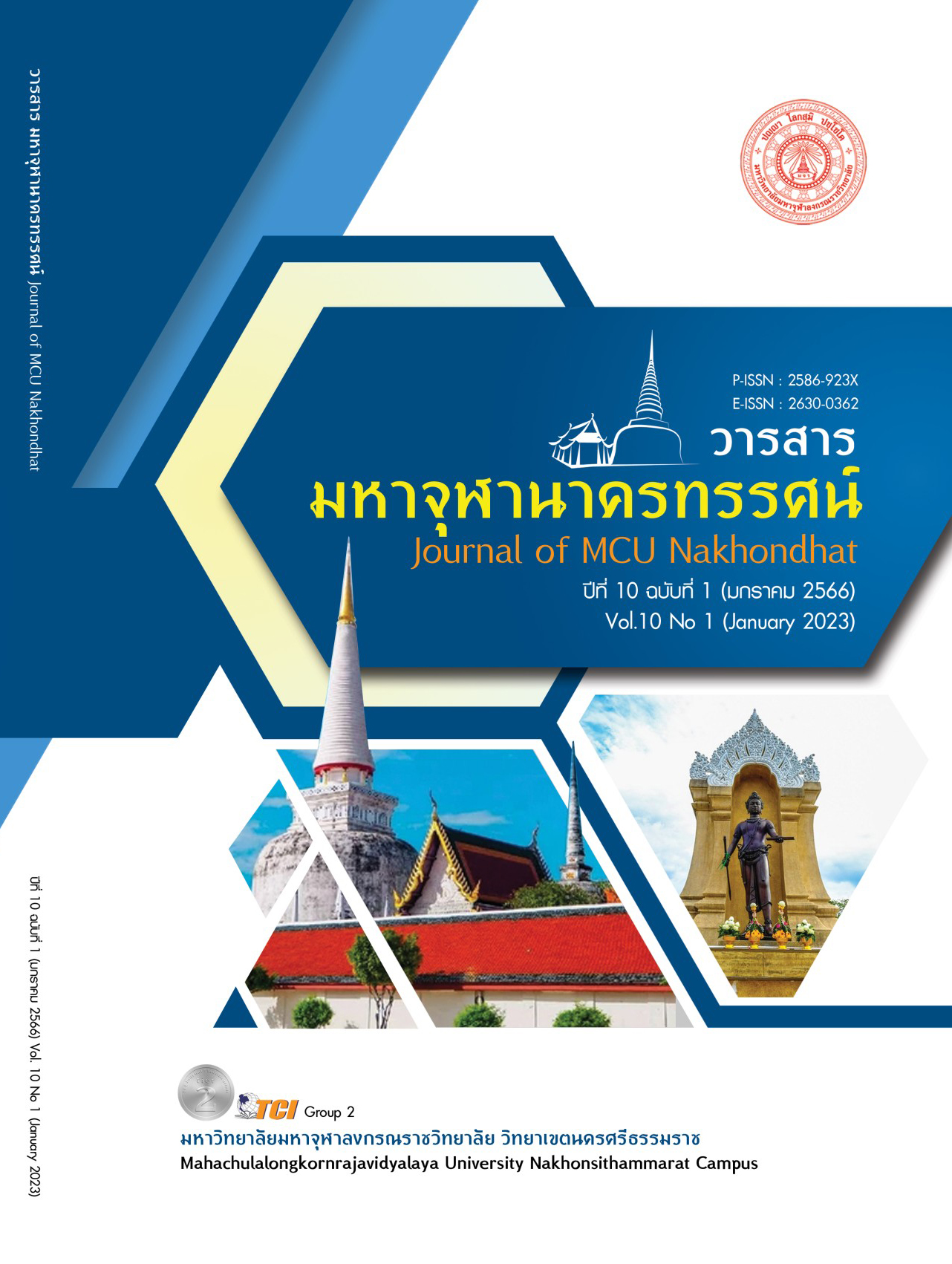THE PROFESSIONAL LEARNING COMMUNITY MANAGEMENT MODEL FOR DEVELOPMENT OF ACTIVE LEARNING MANAGEMENT IN DIGITAL ERA - BOONKHUM RATBUMRUNG SCHOOL, PATHUMTHANI PRIMARY EDUCATION SERVICE AREA OFFICE 1
Main Article Content
Abstract
The objectives of the research are: 1) to determine factors that compose the Professional Learning Community Management Model for Development of Active Learning Management in Digital Era. 2) to develop a the Professional Learning Community Management Model for Development of Active Learning Management in Digital Era. 3) to confirm the Professional Learning Community Management Model for Development of Active Learning Management in Digital Era. 4) to study the result of implementing t the Professional Learning Community Management Model for Development of Active Learning Management in Digital Era by using mixed methods research, i.e., analyzing research documents and publications, expert interviews, three rounds adjustment by Modified Delphi techniques, and survey technique. The selected population for this research was 55 management and teachers of Boonkhumratbumrung School. Tools used for data collection are questionnaires for content analysis, structural interviews, rating scale questionnaires, and checks list. The research found that: 1. The Professional Learning Community Management Model for Development of Active Learning Management in Digital Era has two components which are: Managerial component, there are seven factors, i.e., 1) Leadership, 2) knowledge and professional development, 3) community relationship, 4) teamwork, 5) shared vision, 6) structure of professional learning community and 7) digital technology and its development and development of proactive learning component, there are two factors, i.e., 1) the ability to develop lesson plan and 2) the ability to implement active learning in teaching. 2. The implementation results of the model confirms that it is possible and appropriate to apply the model at higher level.
Article Details

This work is licensed under a Creative Commons Attribution-NonCommercial-NoDerivatives 4.0 International License.
References
กรัณย์พล วิวรรธมงคล. (2561). รูปแบบการพัฒนาครูโดยใช้กระบวนการชุมชนการเรียนรู้ทางวิชาชีพเพื่อส่งเสริมความสามารถการจัดการเรียนรู้ตามแนวสะเต็มศึกษาในระดับการศึกษาขั้นพื้นฐาน. วารสารVeridian E-Journal Silpakorn University , 11(3), 92-114.
กุลชนกนันท์ ธนโชติกิจเกื้อกูล. (2564). รูปแบบการบริหารชุมชนแห่งการเรียนรู้ทางวิชาชีพยุคดิจิทัลในโรงเรียนประถมศึกษาขนาดเล็ก สังกัดสำนักงานคณะกรรมการการศึกษาขั้นพื้นฐาน. วารสารวิชาการเครือข่ายบัณฑิตศึกษามหาวิทยาลัยราชภัฏภาคเหนือ, 1(1), 103-118.
ชูชาติ พ่วงสมจิตร. (2560). ชุมชนการเรียนรู้ทางวิชาชีพและแนวทางการนำไปใช้ในสถานศึกษา. ศึกษาศาสตร์ มสธ, 10(1): 34-41.
ฐาปณัฐ อุดมศรี. (2558). รูปแบบการบริหารโรงเรียนเพื่อเสริมสร้างชุมชนแห่งการเรียนรู้ทางวิชาชีพด้านการวิจัยปฏิบัติการในชั้นเรียน. ใน ดุษฎีนิพนธ์ครุศาสตรดุษฎีบัณฑิต สาขาวิชาบริหารการศึกษา . จุฬาลงกรณ์มหาวิทยาลัย.
พรทิพย์ วงศ์ไพบูลย์. (2560). การเรียนรู้เชิงรุกและการมีส่วนร่วมของผู้เรียน (Active Learning). วารสารสถาบันวิจัยญาณสังวร , 8(2), 327-336.
รัชยา เรืองศรี. (2562). ปรับธุรกิจให้รอดในยุคดิจิทัล = Digital Darwinism. กรุงเทพมหานคร: บริษัท ซีเอ็ดยูเคชั่น จำกัด.
สำนักงานคณะกรรมการการศึกษาขั้นพื้นฐาน. (2560). คู่มือประกอบการอบรมการขับเคลื่อนกระบวนการ PLC ชุมชนแห่งการเรียนรู้ทางวิชาชีพสู่สถานศึกษา. กรุงเทพมหานคร: กระทรวงศึกษาธิการ.
สุกัญญา แช่มช้อย. (2561). การบริหารสถานศึกษาในยุคดิจิทัล. กรุงเทพมหานคร: สำนักพิมพ์จุฬาลงกรณ์มหาวิทยาลัย.
อนุสสรา เฉลิมศรี. (2563). การพัฒนาความสามารถในการจัดการเรียนรู้เชิงรุกของครูประถมศึกษาด้วยกระบวนการชุมชนแห่งการเรียนรู้ทางวิชาชีพ. ใน ปริญญานิพนธ์ปรัชญาดุษฎีบัณฑิต(วิทยาการทางการศึกษาและการจัดการเรียนรู้). มหาวิทยาลัยศรีนครินทรวิโรฒ.
อำนาท เหลือน้อย. (2561). รูปแบบการบริหารจัดการชุมชนแห่งการเรียนรู้ทางวิชาชีพของโรงเรียนมาตรฐานสากล. ใน ดาฎีนิพนธ์ครุศาสตรดุษฎีบัณฑิต. (การบริหารการศึกษา). มหาวิทยาลัยราชภัฏนครสวรรค์.
DiMarco, Danielle. (2019). Teachers' Perceptions of Voluntary Professional LearningCommunity (PLC) Participation and Their Instructional Practices. In Doctoral dissertation. ST.John’s University. Holt Rinehart and Winston.
Erin R. Rentfro. (2007). Professional Learning Communities Impact Student SuccessThis school uses a professional learning community to target students’needs. Retrieved January 20, 2022, from https://www.naesp. org/sites/default/files/resources/2/Leadership_Compass/2007/LC2007v5n2a3.pdf


